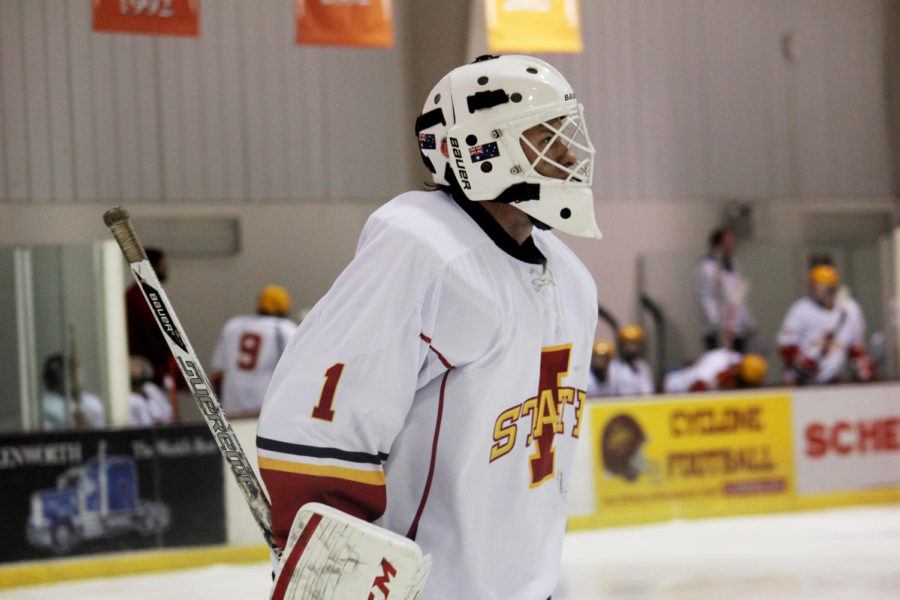Goaltender from down under: Michael Smart reflects on journey to Ames
October 13, 2014
From walking in the hot and dry climate of Western Australia, Michael Smart walks into the local ice arena to a blast of cool air. Although it is one of the few ice rinks in his city, Smart somehow finds his way into the world of ice hockey in Western Australia where the lowest average temperature reaches 42 degrees.
Growing up in Perth, Australia, a city of 1.4 million people on the southwestern tip of the country, Smart was a natural athlete. He participated in track and field, volleyball and Australian football, along with playing ice hockey as a goaltender.
Smart’s introduction to ice hockey came somewhat unconventionally. Knowing the owner of a local skateboard shop in Perth, Smart obtained some street hockey sticks. The owner taught Smart how to play roller hockey, a more mainstream way to play hockey in 90 degree weather.
Smart and some of his friends made a team and competed in the local roller hockey league. But it wasn’t enough for Smart; he wanted more.
The desire to play more hockey drove Smart to the indoor ice rinks in the industrial part of the city. He joined leagues with players ages 10-18 with all sorts of skill levels.
“It was hard to find sticks in Australia,” Smart said. “I just went to my nearest ice rink when I could and signed up to play some ice hockey. It was really unorganized.”
When Smart turned 18, he played goaltender on the Australian U18 hockey team. He played against national teams including Italy, France and Mongolia. Smart even said that his team had to lend Mongolia some hockey equipment to play a game.
After the national team, Smart moved to Canada to attend school and play hockey at a more competitive level, traveling from Ottawa, Ontario to Toronto.
“Smart is a great teammate to be around and always wants to help out when he can,” said Sam McLaughlin, Smart’s former teammate at Harrington College of Canada. “He has a true passion for the game.”
Smart played hockey in Canada in the winters and in Australia in the summers so he could play the full year. In Australia, Smart moved to the highest hockey league, the Australian Ice Hockey League, a semi-professional league full of people from other countries.
Smart manned the net for one of the most successful teams in the AIHL, the Perth Thunder.
“The best players play for Perth,” Smart said. “If you aren’t playing for Perth, than you aren’t really good. That’s as high as it gets in Australia.”
Playing for Perth, Smart allowed 4.68 goals per game and had a .851 save percentage in his 2013 season.
“[Smart] has great reflexes and, if given an opportunity and some experience, he will display his incredible glove hand,” said Perth coach Stan Scott. “Michael is very driven and committed both and off the ice. He has a great work ethic and is a very respectful person.”
Following the 2013 AIHL season, Smart decided to attend college at Gustavus Adolphus College in St. Peter, Minn. There he played hockey for the NCAA Division III program while still having a career in Australia.
In doing that, however, Smart ran into trouble with the NCAA.
He had an agent that helped him look for teams to play for over the summers, and he signed a contract in Australia. According to NCCA rules, that made him a professional player. The NCAA banned Smart for life.
He said that he spent about $30,000 appealing the decision, but the ruling was final. Smart claims he is the only player to be banned from NCAA Division III.
“Hockey hasn’t always been kind to me,” Smart said. “When I found out I couldn’t play, I started looking for [American Collegiate Hockey Association] club programs across the country. It came between Arizona State and Iowa State.”
Since the NCAA doesn’t govern the ACHA, Smart was allowed entry to the league. He eventually chose Iowa State because of his familiarity with the Midwest and a better chance for playing time.
After the team selection following the Oct. 5. and 6 Huntsville Havoc series, Smart found himself on the Division III squad with two other goalies. But he still has optimism.
“I was hoping to play for Division I this year. I think everyone did,” Smart said. “When it came to not playing or playing Division III, I chose playing because I can get some games in net and have a shot at starting next year.”







